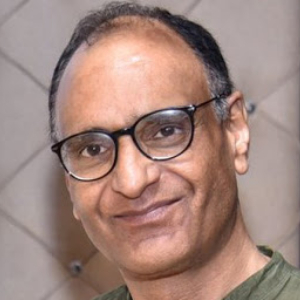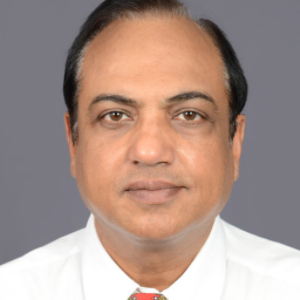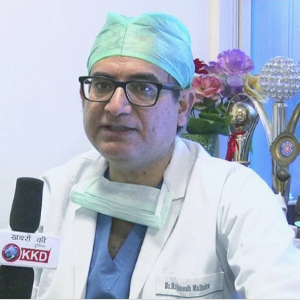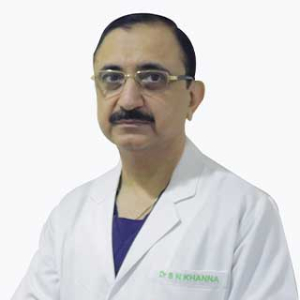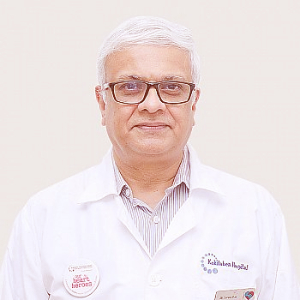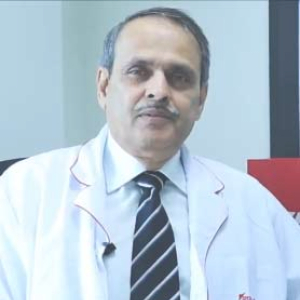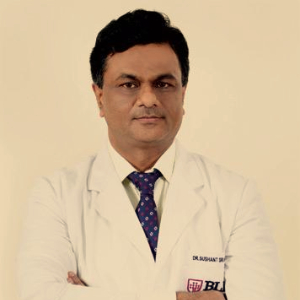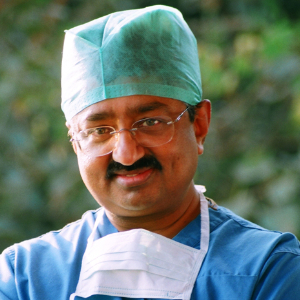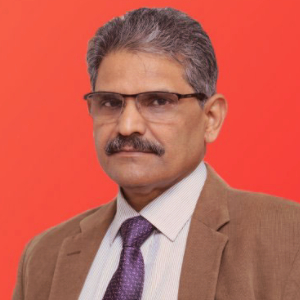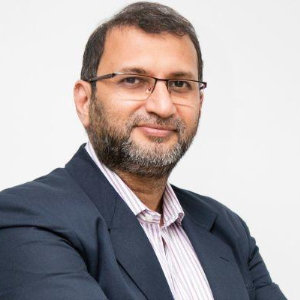Best ECMO Doctors in India
- Cardiac Surgeon, Gurugram, India
- Over 30 years’ experience
Profile Highlights:
- Dr. Murtaza A Chishti is one of the most well-known and distinguished Cardio-Thoracic and Vascular surgeons in North India
- He has more than 3 decades of experience in the field of cardiac surgery with a specialization in heart and lung transplantation surgeries.
- He has performed more than 6000 cardiac procedures that include Total Arterial revascularization, aortic surgery, complex and re-operative coronary surgery, CABG, and several other cardiothoracic surgeries.
- Cardiac Surgeon, Mumbai, India
- Over 36 years’ experience
Profile Highlights:
- Dr. Nandkishore Kapadia is one of the leading Cardiothoracic and vascular surgeons in India excelling in heart and lung transplant surgeries.
- He has 36+ years of experience in the field during which he has performed over 10000 CABGs, 2000 heart valve repairs, and 800 minimally invasive cardiac surgeries.
- He has also performed more than 5000 open heart surgeries, 200 heart and lung transplant surgeries, and 150 VAD and ECMO implantation procedures.
- Cardio Thoracic & Vascular Surgeon, New Delhi, India
- Over 30 years’ experience
Profile Highlights:
- Dr. Rajneesh Malhotra is a distinguished cardiovascular and thoracic surgeon in India with over 30 years of experience.
- He is an expert in all kinds of cardiac surgeries with a special interest in Robotic Cardiac surgery along with minimally invasive cardiac surgery and other traditional heart surgeries.
- Dr. Rajneesh Malhotra has performed several complex and high-risk cases and also specializes in heart transplant surgeries and surgeries for heart failure.
- Cardiac Surgeon, New Delhi, India
- Over 26 years’ experience
Profile Highlights:
- Dr. Surendra Nath Khanna is a leading cardiovascular and thoracic surgeon specializing in minimally invasive cardiac surgeries, heart valve repairs, and heart failure surgeries.
- Dr. Surendra Khanna has 26+ years of experience in cardiac care and has performed more than 17000 surgeries that include beating heart surgery, mitral and aortic valve surgery, and double valve replacement surgery.
- His expertise lies primarily in adult cardiac surgeries and has done some of the most complex cardiac surgeries in India
- Pediatric Cardiac Surgeon, Mumbai, India
- Over 33 years’ experience
Profile Highlights:
- Dr. Suresh Rao is a highly experienced cardiac surgeon specializing in congenital heart diseases and has performed more than 12,000 surgeries for congenital heart diseases and disorders.
- Dr. Rao holds an extensive experience of over 33 years in Pediatric and congenital cardiac surgery and has performed numerous simple and complex heart defect surgeries with successful outcomes.
- Dr. Suresh Rao introduced the Modified Ultrafication procedure after congenital heart surgery in India and has used the procedure in the treatment of a large number of pediatric as well as adult patients.
- Cardiac Surgeon, Mumbai, India
- Over 30 years’ experience
Profile Highlights:
- Dr. Suresh V Joshi is a cardiac surgeon in Mumbai with expertise in undertaking complex surgeries as a result of congenital heart diseases.
- He holds an extensive experience of over 3 decades in cardiac surgery and specializes in Coronary Artery Bypass Grafting (CABG); specifically Beating Heart CABG and Minimally Invasive Cardiac Surgeries.
- He is an expert in all kinds of coronary and interventional cardiac procedures and has performed over 15,000 cardiac surgeries for different kinds of heart defects and disorders.
- Chairperson Heart & Lungs Transplant, New Delhi, India
- Over 20 years’ experience
Profile Highlights:
- Dr. Sushant Srivastava is a renowned cardiovascular and thoracic surgeon specializing in heart transplantation.
- He specializes in performing Beating Heart Bypass surgeries and is credited with performing the procedure on the oldest patient in India (96 years old). He also performed the first awake CABG in North India.
- He has taken up close to 10000 cardiac cases in his career and performed 3000+ cardiac surgeries related to Coronary Artery Bypass Grafting (CABG), redo coronary artery surgery, heart failure surgeries, heart valve surgeries, and various other types of cardiac surgeries.
- Cardiac Surgeon, Bengaluru, India
- Over 30 years’ experience
Profile Highlights:
- Dr. Vivek Jawali is a renowned Cardiothoracic and Vascular Surgeon in India and has performed more than 18,000 cardiothoracic and cardiovascular surgeries.
- He has several firsts to his credit that including the first beating heart bypass surgery in 1992 and the first Minimally Invasive Heart Bypass surgery in 1994 in India.
- He performed the first Awake Cardiac Surgery in 1999 which is done without general anesthesia or ventilator but under continuous high thoracic epidural. He also performed the first awake open heart surgery in the world without general anesthesia or ventilator on a 74-year-old patient for triple bypass with aortic valve replacement.
- Cardiac Surgeon, New Delhi, India
- Over 30 years’ experience
Profile Highlights:
- Dr. Yugal Kishore Mishra is a well-known cardiovascular and thoracic surgeon in Delhi specializing in Minimally Invasive and Robotic cardiac surgeries.
- He has 3 decades of experience in CTVS and has performed more than 19,000 open heart surgeries to date that including various types of minimally invasive cardiac procedures such as the port access approach for valve surgery and ASD closure.
- He is the founder of the Robotic Cardiac Surgery Program at Fortis Escorts Heart Institute where he has performed over 500 robotic cardiac surgeries.
- Cardiac Surgeon, Mumbai, India
- Over 24 years’ experience
Profile Highlights:
- Dr. Zainulabedin Hamdulay is one of the best cardiac surgeons in Mumbai, India, and specializes in devising new and innovative techniques for cardiac surgeries.
- He has 24+ years of experience and has performed over 8000 cardiac surgeries that included complex valve repairs, congenital cardiac surgery, CABG, and several minimally invasive cardiac surgeries.
- With a motive to provide the best, affordable and comprehensive cardiac care to all his patients, he founded the Hamdulay Heart Foundation to provide aid to the economically backward community.
Best ECMO Hospitals in India
Extracorporeal Membrane Oxygenation (ECMO)
ECMO or extracorporeal membrane oxygenation involves pumping the blood outside from your body into a heart-lung machine. The machine removes carbon dioxide and pumps back oxygen-filled blood into your body tissues. The flow of the blood is from the right side of your heart to the membrane oxygenator of the heart-lung machine that rewards and sends it back to your body. The procedure allows the organs to rest and heal while the blood bypasses your heart and your lungs. Usually used in infants with critical disorders of the heart and the lungs, you may also find its use for some other infections.
The method involves the use of a membrane oxygenator (acting as an artificial lung) that oxygenates the blood. It supplies oxygen to the blood and returns it to your body by combining with a warmer and a filter. Used for providing oxygenation while your doctor treats the disorder, it also benefits adults and older children.
Types and parts of ECMO
ECMO is of two types:
- Veno-venous ECMO (VV ECMO)- It takes blood from the veins and returns the blood to the vein. This type of ECMO finds its application in supporting lung function.
- Veno-arterial ECMO (VA ECMO)- It takes up the blood from one of the veins and returns the blood back to the artery. It supports the lungs as well as your heart. Being more invasive than veno-venous ECMO, there might be a need to close off the carotid artery (carotid artery is the main artery that extends from the heart to the brain).
Parts of ECMO include:
- Cannulae- They are large tubes (catheters) that your doctor will insert into your blood vessels for taking up and returning the blood back to the body.
- Membrane oxygenator- Used for oxygenating the blood, it is an artificial lung.
- Warmer and filter- Its purpose is to warm and filter your blood before the cannulae or catheters return the blood back to your body.
The cannulae take up blood with less oxygen from your body and send it to the oxygenator during ECMO. The membrane oxygenator will then pump oxygen into your blood and send this oxygenated blood through the warmer & filter to finally return the blood to your body.
Reasons for ECMO
ECMO is for the people suffering from critically ill conditions of the heart and the lungs or recovering from a heart transplant and when other life support procedures didn’t work. If you are suffering from serious but reversible lung or heart disorders, then your doctor will place you on ECMO. For the newborns, it is beneficial as it allows their heart and lungs to develop. There is a substantial increase in the survival rates with ECMO. It helps your body by providing oxygen to your body tissues. You may need to go for ECMO during conditions enlisted here.
For infants:
- ARDS (Acute Respiratory Distress Syndrome)
- Congenital diaphragmatic hernia (if there is a defect in the diaphragm)
- Pulmonary hypertension (high blood pressure present in the lungs)
- Respiratory failure
- Sepsis (an infection that can be life-threatening)
- Pneumonia
For older children:
- Severe pneumonia
- Cardiac surgery
- Toxic materials present in the lungs because of aspiration
- Infections
- Trauma
- Asthma
- Congenital heart defects
For adults:
- Decompensated cardiomyopathy (heart muscle disease)
- Severe hypothermia (low body temperature)
- Acute myocardial infection (heart attack)
- Carcinogenic shock (shock caused when the heart is unable to pump enough blood)
- Myocarditis (presence of inflammation in the muscles of the heart)
- Post-transplant complications
- Pulmonary embolism (blockage in the pulmonary artery of the lungs)
- Hantavirus pulmonary syndrome
- Influenza (flu)
Preparation for ECMO
Your doctor will first check you before placing you on ECMO. He or she will perform a cranial ultrasound of your brain to ensure that there’s no bleeding. It will also determine if your heart is working. You might need to undergo a chest x-ray daily while on ECMO. Your doctor will prepare the equipment after determining if you need ECMO. A trained team will perform your ECMO. The team will include respiratory therapists, ICU registered nurses, consultants & support personnel, rehab specialists, perfusionists who specialize in performing ECMO and a 24/7 transport team.
What to expect?
During ECMO
During ECMO, your doctor will first discuss all the details of the procedure with you and/or your family. Your doctor will place the cannulae in your chest, neck or groin region depending on your age after giving you general anesthesia (sleep medicine). You will be sleeping due to the sedation while being on ECMO. ECMO will perform the function of the lungs or heart. Your doctor will monitor you closely during ECMO with the help of daily X-rays. Apart from this, the doctor will also be monitoring your:
- Blood pressure
- Heart rate
- Oxygen levels
- Respiratory rate
With the help of a ventilator and a breathing tube, your lungs will continue to work and remove the secretions from your body. You will continuously receive all the medications through intravenous catheters including heparin. Heparin prevents the clotting of blood while it travels during ECMO as it is a blood thinner. Your doctor will place you on ECMO for a minimum of three days to even a month, depending on your condition. However, the higher you are on ECMO, the higher is the risk associated with ECMO.
After ECMO
After noticing the improvements in your condition, your doctor will slowly reduce the amount of oxygenated blood that you receive through the ECMO and then wean you off from ECMO. Once you get off from this, your doctor will place you on a ventilator for a certain period of time. However, you will still require a regular follow-up for monitoring the underlying condition.
Results of ECMO
Risks of ECMO
The most common risks associated with ECMO are:
- Coagulopathy (blood clotting disorder)
- Seizures
- Bleeding
- Infection
- Stroke (damage to the brain because of the bursting of blood vessels or blood loss)
- Thromboembolism (blood clot)
- Limb ischemia (loss of blood in the limbs)

